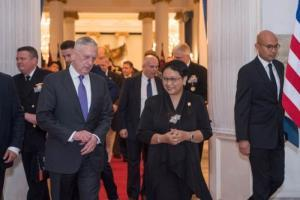Q:Yes, sir. But if you're arming those police forces, ostensibly, well-armed police force, as you describe them, they wouldn't be able to stand up if the regime decided to reclaim some of this territory. So do you have to provide guarantees that if the regime decides to step in, the U.S. will return?
SEC. MATTIS:No. Right now, our forces we are reducing. We don't need as many forces there are before if -- if we break ISIS out of all of it's strongholds. But this is a force that holds. There will be some U.S. military there, but the main effort shifts to state department's diplomats. And they're putting more of their diplomats in and that again will be resolved by in Geneva.
And so we've got NCOs in among them, officers in among them. We're not doing the fighting but we're keenly aware of where they are fighting and we're keenly aware of where our ammunition is being used and that sort of thing, so we don't lose control of it. But it's a -- a diplomatic solution, is what we're doing -- what we're doing this for. It's not for a long term U.S. presence.
We're not occupying that place. We're just making certain that it's turned over responsibly to the locals and that the locals have a seat at the table in Geneva.
Q:Sir, does the Turkish offensive put any U.S. forces at risk?
SEC. MATTIS:Did they what?
Q:Does the Turkish offensive put any U.S. forces at risk?
SEC. MATTIS:We have had no U.S. forces at risk at this time.
Q:Switching targets, sir, I'd (inaudible ) to ask you about the shutdown and it's context in this trip. We've heard your initial assessment of what it's doing to the military. I'd be interested to ask about any practical changes that that's incurred for you on this trip.
|

